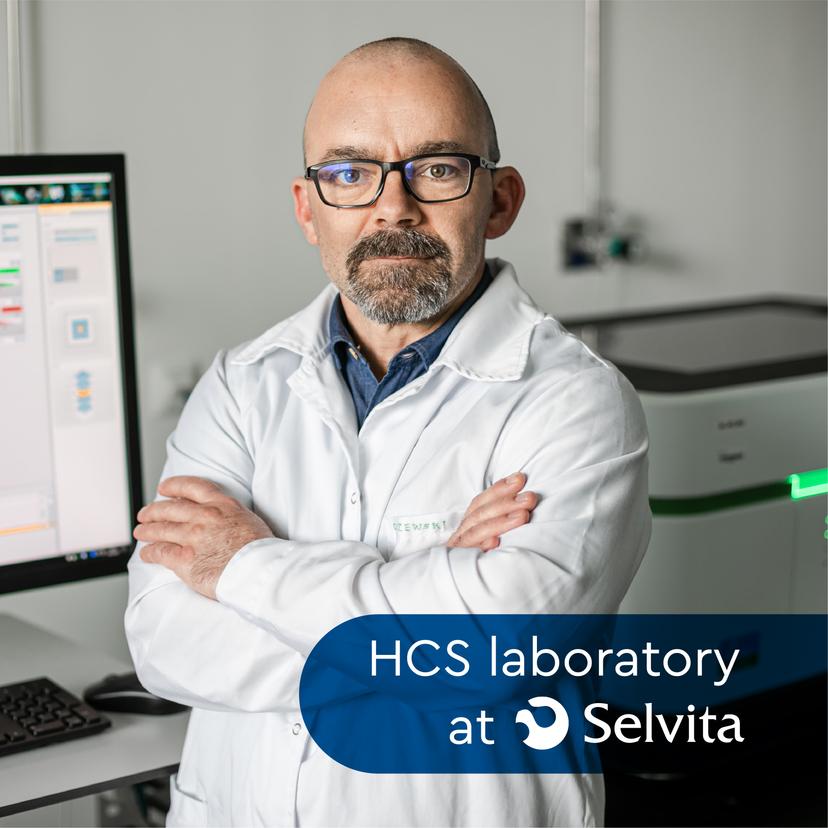High-content screening in drug discovery
Explore the impact this technology-driven approach has had on the pharmaceutical industry
17 Nov 2023

High-content screening (HCS) has revolutionized the field of drug discovery, offering a powerful and versatile approach to identify potential drug candidates, understand their mechanisms of action, and assess their efficacy. In this article, Selvita delves into the world of HCS, exploring its principles, applications, and the significant impact it has had on the pharmaceutical industry.
Introduction to HCS
HCS is a technology-driven approach that combines the principles of cell biology, automation, and image analysis to investigate the effects of compounds on cellular and subcellular levels. It enables the simultaneous analysis of multiple parameters within living cells, making it a valuable tool in drug discovery and development. HCS is distinguished by its ability to extract information-rich data from complex biological systems, allowing for a more comprehensive understanding of cellular responses to potential drug candidates.
Principles of HCS
The core principles of HCS involve:
Cell-based assays: HCS primarily relies on cell-based assays. Various cell lines, including primary cells and cell cultures, can be used to represent specific disease models or cellular processes.
Fluorescent probes and markers: Fluorescent dyes, antibodies, and genetically encoded markers are employed to label specific cellular components, such as nuclei, cytoskeleton, or organelles. These labels provide the means to monitor various cellular features.
Automated imaging systems: HCS utilizes automated microscopes and imaging systems to capture high-resolution images of labeled cells. These systems can scan multiple fields of view and track thousands of individual cells in a single experiment.
Image analysis software: Specialized image analysis software processes the acquired images. It can quantify various parameters, such as cell morphology, protein localization, and changes in cellular structures.
Data analysis: The data extracted from HCS experiments can be analyzed to identify potential drug candidates, elucidate mechanisms of action, and assess compound toxicity. Advanced data analysis tools and machine learning algorithms are often employed.
Applications of HCS in drug discovery
Target identification and validation: HCS plays a crucial role in the early stages of drug discovery by identifying and validating potential drug targets. By systematically assessing the effects of compounds on specific cellular pathways, researchers can pinpoint novel targets for therapeutic intervention.
Hit discovery: HCS can rapidly identify compounds that have a desirable effect on a specific cellular phenotype, making it a valuable tool for hit discovery in drug development.
Mechanism of action studies: Understanding how potential drug candidates work within cells is essential. HCS allows researchers to elucidate the mechanisms of action, providing insights into the compound's interaction with cellular targets and pathways.
Toxicity assessment: Evaluating the safety profile of drug candidates is a critical aspect of drug development. HCS can detect adverse effects of compounds on cell viability, morphology, and function, aiding in the early identification of toxic compounds.
Patient-specific drug screening: HCS can be tailored to patient-specific cells or disease models, allowing for personalized medicine approaches. This is particularly valuable in oncology, where therapies can be customized based on a patient's unique tumor characteristics.
3D cell culture models: To mimic the in vivo microenvironment more closely, HCS is increasingly being used with 3D cell culture models. This approach provides more physiologically relevant data, particularly for cancer and tissue engineering applications.
Phenotypic screening: Unlike traditional target-based drug discovery, HCS often takes a phenotypic approach. This means that compounds are evaluated based on their ability to induce specific cellular phenotypes, making it more likely to uncover novel therapeutic agents.
Drug repurposing: HCS can be employed to identify existing drugs with unrecognized potential for new therapeutic indications, saving time and resources in drug development.
Technological advancements in HCS
HCS has evolved significantly with advancements in technology. Some notable trends and developments include:
Microfluidics: Integration of microfluidic systems for precise control of cellular microenvironments, enabling more sophisticated and relevant assays.
CRISPR-Cas9: The use of genome editing techniques, such as CRISPR-Cas9, to create cellular models with specific genetic modifications, allowing for more targeted studies.
Machine learning: The application of machine learning and deep learning algorithms for more accurate and efficient image analysis and data interpretation.
Organ-on-a-chip models: The development of microphysiological systems, or 'organs-on-chips', to simulate in vivo conditions for drug testing.
Multi-omics integration: Combining HCS data with genomics, transcriptomics, and proteomics data for a more holistic understanding of cellular responses to compounds.
High-throughput screening (HTS) integration: The fusion of HCS with high-throughput screening to increase the number of compounds that can be assessed simultaneously.
Challenges and future directions
While HCS has revolutionized drug discovery, it is not without challenges. Some of these challenges include:
Data analysis complexity: Dealing with the massive amount of data generated by HCS experiments requires robust and sophisticated data analysis methods.
Reproducibility: Ensuring the reproducibility of results in HCS can be challenging, particularly when using complex biological models.
Cost and resource intensity: Setting up and maintaining HCS platforms can be costly and require substantial resources.
Biological complexity: Biological systems are highly complex, and translating findings from cellular assays to clinical outcomes can be challenging.
In the future, HCS is likely to continue evolving, with an emphasis on addressing these challenges. Integrating artificial intelligence and automation will play a significant role in streamlining the process and improving the reliability of results.
HCS has become an indispensable tool in drug discovery, allowing for the systematic evaluation of potential drug candidates in a comprehensive and context-rich manner. Its ability to assess multiple cellular parameters simultaneously, coupled with technological advancements, positions it as a central pillar in the quest for novel therapeutics. As technology continues to advance and our understanding of biology deepens, HCS will continue to play a pivotal role in accelerating drug discovery and the development of more effective and personalized medicines.

